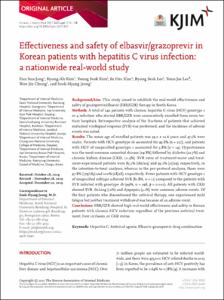KUMEL Repository
1. Journal Papers (연구논문)
1. School of Medicine (의과대학)
Dept. of Internal Medicine (내과학)
Effectiveness and safety of elbasvir/grazoprevir in Korean patients with hepatitis C virus infection: a nationwide real-world study
- Keimyung Author(s)
- Chung, Woo Jin
- Department
- Dept. of Internal Medicine (내과학)
- Journal Title
- The Korean journal of internal medicine
- Issued Date
- 2020
- Volume
- 36
- Issue
- sippl 1
- Abstract
- Background/aim:
This study aimed to establish the real-world effectiveness and safety of grazoprevir/elbasvir (EBR/GZR) therapy in South Korea.
Methods:
A total of 242 patients with chronic hepatitis C virus (HCV) genotype 1 or 4 infection who started EBR/GZR were consecutively enrolled from seven tertiary hospitals. Retrospective analysis of the fractions of patients that achieved sustained virological response (SVR) was performed, and the incidence of adverse events was noted.
Results:
The mean age of enrolled patients was 59.0 ± 12.6 years and 47.5% were males. Patients with HCV genotype 1b accounted for 93.8% (n = 227), and patients with HCV of unspecified genotype 1 accounted for 5.8% (n = 14). Hypertension was the most common comorbid disease (29.8%) followed by diabetes (22.7%) and chronic kidney disease (CKD, 12.4%). SVR rates of treatment-naïve and treatment-experienced patients were 85.5% (182/213) and 93.1% (27/29), respectively, in the intention-to-treat analyses, whereas in the per-protocol analyses, those were 97.8% (179/183) and 100% (28/28), respectively. Fewer patients with HCV genotype 1 of unspecified subtype achieved SVR (81.8%, n = 11) compared to the patients with SVR infected with genotype 1b (99%, n = 198, p < 0.001). All patients with CKD showed SVR. Itching (12%) and dyspepsia (4.1%) were common adverse events. Of the four patients who discontinued the antiviral therapy, one experienced mild fatigue but neither treatment withdrawal was because of an adverse event.
Conclusions:
EBR/GZR showed high real-world effectiveness and safety in Korean patients with chronic HCV infection regardless of the previous antiviral treatment, liver cirrhosis, or CKD status.
- Keimyung Author(s)(Kor)
- 정우진
- Publisher
- School of Medicine (의과대학)
- Citation
- Eun Sun Jang et al. (2020). Effectiveness and safety of elbasvir/grazoprevir in Korean patients with hepatitis C virus infection: a nationwide real-world study. The Korean journal of internal medicine, 36(sippl 1), S1–S8. doi: 10.3904/kjim.2019.357
- Type
- Article
- ISSN
- 2005-6648
- Source
- https://www.kjim.org/journal/view.php?doi=10.3904/kjim.2019.357
- Appears in Collections:
- 1. School of Medicine (의과대학) > Dept. of Internal Medicine (내과학)
- 파일 목록
-
-
Download
 oak-2020-0471.pdf
기타 데이터 / 314.94 kB / Adobe PDF
oak-2020-0471.pdf
기타 데이터 / 314.94 kB / Adobe PDF
-
Items in Repository are protected by copyright, with all rights reserved, unless otherwise indicated.